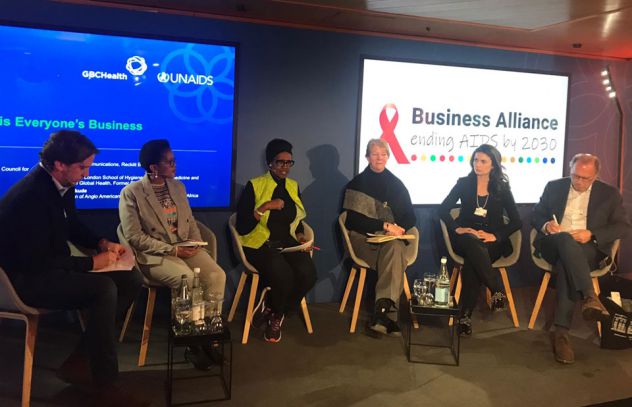
Business Alliance to End AIDS by 2030 is announced at the World Economic Forum
DAVOS/GENEVA, 23 January 2020—The Business Alliance to End AIDS by 2030, a public-private coalition co-hosted by UNAIDS and GBCHealth, was announced today in Davos, Switzerland, on the margins of the World Economic Forum Annual Meeting.
The Business Alliance to End AIDS brings together forward-looking companies to strengthen cross-sector collaboration, build on common values and create spaces for effective collaboration. It aims to provide businesses with the necessary tools and support needed from public sector partners to help realize the goal of ending AIDS by 2030.
Business has been and continues to be essential to the AIDS response, from challenging the stigma surrounding HIV, building innovative partnerships among companies across industries and implementing diagnosis, treatment and prevention programmes within workplaces and surrounding communities. However, these models need to operate to scale to meet the gaps in investment and implementation needed to meet the target of ending AIDS by 2030.
“Today, every single company must make a positive contribution to the societies they serve—this is not an option, this is an imperative. Beyond reaching their economic objectives, companies must deliver social and environmental impact. The private sector has a key role to play in the multisectoral response to HIV. Businesses must ensure that their employees, their suppliers and communities receive life-saving HIV treatment, prevention and care programmes. Together, we can end AIDS by 2030,” said Winnie Byanyima, Executive Director of UNAIDS.
“Realizing a world free of AIDS is beyond the reach of one company. Business as usual will not achieve the Sustainable Development Goals, nor will innovation by a few pioneers. This agenda will require collaboration across sectors, supply chains and economic systems, as well as innovative partnerships with governments and civil society. We at Anglo American are committed to be part of the Business Alliance to End AIDS by 2030 and urge other businesses to join our collective efforts,” said Nolitha Fakude, Chairperson of Anglo American’s Management Board in South Africa.
“Responding to HIV matters to business, and businesses have been leaders in the global AIDS response for over two decades. Business innovations in products and services, relationships with employees, consumers and policymakers, core capabilities and logistics, data analytics, marketing and financial resources can all help to fill the gaps in publicly funded HIV testing, prevention and treatment programmes. Forward-thinking businesses are needed to help develop holistic solutions and manage risk. We are at a crossroads. The future will be determined by what we do today,” said Nancy Wildfeir-Field, President of GBCHealth.
The Business Alliance to End AIDS by 2030 will act as a vehicle and a collective voice to disseminate best practices through public platforms, their companies and their respective supply chains. In addition, it will serve as a collective body to help shape regulations and policies that support HIV prevention and treatment programmes and end HIV-related stigma and discrimination.
For further information on the Business Alliance to End AIDS by 2030 and how you can join, please contact Frauke Joosten at joostenvegliof@unaids.org.
WHAT IS PANCAP?
PANCAP is a Caribbean regional partnership of governments, regional civil society organisations, regional institutions and organisations, bilateral and multilateral agencies and contributing donor partners established on 14 February 2001. PANCAP provides a structured and unified approach to the Caribbean’s response to the HIV epidemic, and coordinates the response through the Caribbean Regional Strategic Framework on HIV and AIDS to maximise efficient use of resources and increase impact, mobilise resources and build the capacity of partners.
What are the Global AIDS Strategy 2021–2026 targets and commitments?
If targets and commitments in the strategy are achieved:
- The number of people who newly acquire HIV will decrease from 1.7 million in 2019 to less than 370 000 by 2025
- The number of people dying from AIDS-related illnesses will decrease from 690 000 in 2019 to less than 250 000 in 2025.
- The goal of eliminating new HIV infections among children will see the number of new HIV infections drop from 150,000 in 2019 to less than 22,000 in 2025.
What are the 95-95-95 Targets for ending AIDS?
- 95% of People Living with HIV know their HIV status;
- 95% of people who know their status on treatment; and
- 95% of people on treatment with suppressed viral loads.
HELPFUL LINKS:
Global AIDS Strategy 2021–2026, End Inequalities, End AIDS
https://pancap.org/pancap-documents/global-aids-strategy-2021-2026-end-inequalities-end-aids/
Caribbean Regional Strategic Framework on HIV and AIDS (CRSF) 2019-2025
https://pancap.org/pancap-documents/caribbean-regional-strategic-framework-2019-2025/
